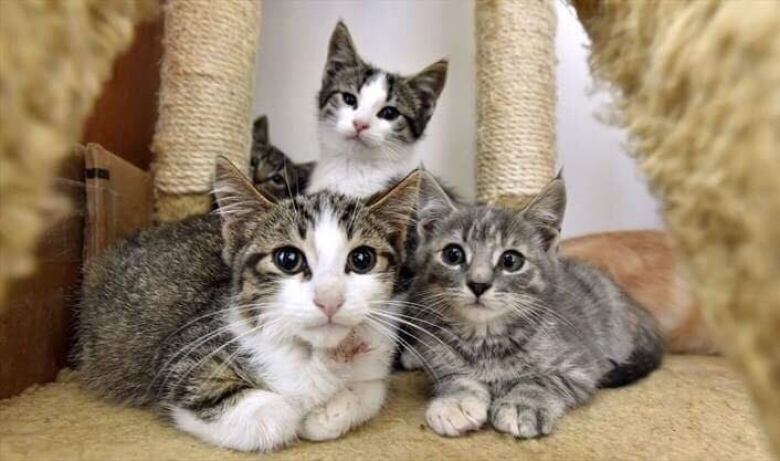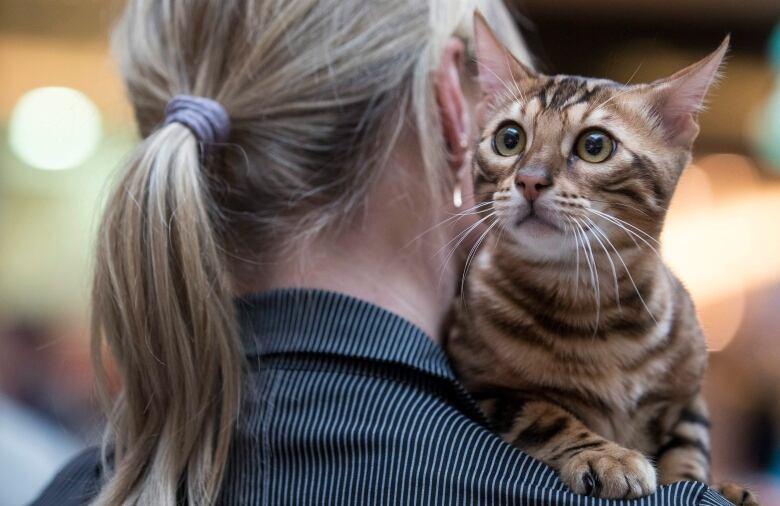Cat behaviour makes sense if you think like one, says feline expert
Host of Animal Planet's Psycho Kitty, Pam Johnson-Bennett says we need to stop comparing cats to dogs

Cats and dogs are very different creatures.
We think of dogs as social animals who love us unconditionallyand the ultimate human companion man's best friend. Cats get a bad rap as solitary, disagreeable and even downright rude.
Cats are seen as standoffish, furry little jerks when you compare them to dogs, which is theproblem, says a specialist on cat behaviour.
- Calgary police dog Jester back to work after being stabbed in head
- Great horned owl rescued from soccer net at Airdrie school
Best-selling author and host of Animal Planet's Psycho Kitty,Pam Johnson-Bennett says we need to stop comparing the two and appreciatethe species for what they are.
Johnson-Bennett was in Calgary this week for a Beakerhead event, but took the time to speak with the Calgary Eyeopenerand break down some of cats' more mysterious behaviours.
The following is an edited version of her interview with host David Gray.
Q. Do cats actually care about their owners?
A. Cats care very much. I think the big problem is we've got to stop comparing cats to dogs. Dogs are great at being dogs and cats are great at being cats.
Cats are social creatures and people have the misconception that they aren't. They are solitary hunters because they are small predators and they only hunt enough for one. That's why people have that misunderstanding, but they're very social.

With other cats their socialization is builtaround the availability of resources because cats are concerned with survival, that's why you'll see a group of cats that live outside near a restaurant they have to know where food is.
But they are social with humans, we just have to remember they're also territorial so we have to create that security. Dogs love to go with you in the car, want to go on vacation, but your cat really prefers to stay at home and just know that you're going to be coming back.
Q. Do cats like going with us on adventures?
A. Some of the cats do. Some people are able to walk their cats on harnesses and leashes, but the thing is you have to get the cat comfortable with that. You can't just decide that your indoor cat that you've had for seven years, who typically hides under the bed 23 hours a day, is going to want to go with you on a boat ride down the lake.
You have to slowly get them used to adventures. The best way is to startwhen a cat is a kitten. Take the time to do a lot of socialization in terms of getting them comfortable with being handled by people, going out in the car, being in the carrier, having new experiences andeven the sound of the vacuum cleaner.

If you don't get the cat used to those things, then the first time is very scary. Alot of people can relate to this because every time it's time to go to the veterinarian, you can't find the cat because the cat thinks the carrier means bad things so it decides to hide. If you get the cat used to these things, then it doesn't alwayshave to be a negative experience and it's so much easier.
Q. Why is it when you go into a room with a cat, the person who likes cats least is the one the cat pays the most attention to?
A. That behaviour makes perfect sense if you look at it from a cat's point of view.Cat lovers comein and bargetowards the cat, wanting topet him and hold him but remember, even though cats are social, they're territorial, so this is the cat's territory and someone who does not sound familiar, smell familiar or look familiar is coming right at them and the cat hasn't had a chance to decide if this is friend or foe.
Wherein the person that doesn't like cats or the person who is allergic does not makes direct eye contact, doesn't make any overtures to the cat. Thatactually allows the cat to take a breather and relax to do a little investigation. Cats feel that person is giving them the control they need and usually ends up on that person's lap.

A lot of it is common sense if you had no idea that someone was coming to your house and someone you didn't know just came right in the door, came right at you and invaded your personal space that's uncomfortable.
We tend to not look at things from a cat's point of view, we tend to just feel the cat should just accept things and we never really give the chance to make that decision on their own.
Q. Why is it if you're sitting down, doing something like reading a book or onyour laptop, yourcat wants to jump between you and whatever you're doing?
Cats are very in tune with us and that's how they know things like when it's time to go to the veterinarian even before we've even gotten the carrier out of the closet. When they see that your focus is on whatever you're doing, they want to get in on what your focus is.
That makes perfect sense for them and usually get rewarded for it because we often pet them. Even if you shoo them away, you're still giving them attention, so it still works for them.
With files from the Calgary Eyeopener












_(720p).jpg)


 OFFICIAL HD MUSIC VIDEO.jpg)
.jpg)



























































































